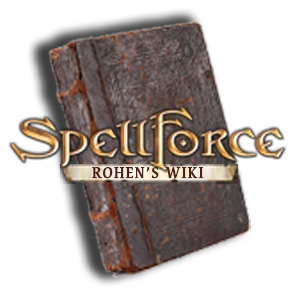| SpellForce 3 Game |
| ℹ This game is not Lore Accurate with the Canon story, Timeline and not part of the SpellForce universe! |
SpellForce 3 is a video game developed by Grimlore Games and published by THQ Nordic. It was released for Microsoft Windows on 7 December 2017. Two standalone expansions were released for SpellForce 3, SpellForce 3: Soul Harvest and SpellForce 3: Fallen God, as well as a free multiplayer-only version called SpellForce 3: Versus. On 6 December 2021, an upgraded version of the original, SpellForce 3 Reforced was released for Microsoft Windows, and was released for PlayStation 4, PlayStation 5, Xbox One and Xbox Series X/S on 7 June 2022.
Setting
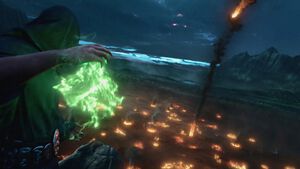
SpellForce 3 is set 500 years before the Convocation in the Kingdom of Nortander and depicts the events that led to the founding of The Circle. A powerful and ambitious mage known as Isamo Tahar orchestrated a mage rebellion with the intent of overthrowing the crown but his plans were foiled and he along with his co conspirators were killed at the final battle. In the following years Nortander is led by the incompetent regent Angar Arandir who rules in the absence of Queen Ayelith who was left in a coma following the final battle of Greyfell, Mages are heavily persecuted and hunted down by not only the government but also a religious cult known as the Purity of Light who seem to be gaining more power as time passes by and also a deadly plague called Bloodburn has recently swept across the kingdom. The player takes control of a young corporal, who is Isamo's child that was pardoned and trained by the queen's spymaster, who prepares to perform his duties as a loyal soldier.
Characters
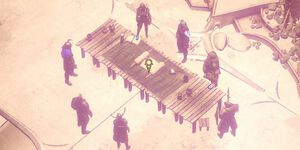
- The Corporal/Tahar
Protagonist of the story - Rondar Lacaine
leader of the Purity of Light and main antagonist of the story - Rohen Tahir
Former rebel and companion - Yria
Outcast mage and companion - Angar Arandir
Regent of the Kingdom of Nortander - Bertrand Carpel
Wolf Guard officer and old friend of The Corporal - Sentenza Noria
Comamnder of Wolf Guard and The Corporal's mentor
Canon
Spellforce 3 and by extension its addons contain a significant amount of lore inaccuracies that completely contracts what was established in the previous games, inaccuracies that cannot be excused by the virtue of being a prequel story, and are thus considered non-canon. Below is a list of the major inaccuracies. (Keep in mind that these are only the major ones)
- The circle was founded by the order of Queen Ayelith.
- The circle mages were outcasts and vagabonds.
- The Morhir elves were political exiles.
- The Guardians require hibernation.
- The Mage Wars were an exclusive event of Nortander.
- Angar Arandir was not a famous bard.
- Ankbrand is not the capital of Nortander.
- Mulandir was a Shaper ruin.
- The Blades were created by Rondar Lacaine.
- Iron Falcons were a weak and exclusively human organization.
Gameplay
Players control a character they created and up to three companions, each with different abilities. These characters can be customized by equipping them with different items such as weapons, armor and jewelry which influence their status in battle. Some maps require players to construct a base of operations and specialized buildings to gather resources and recruit units to defeat larger groups of enemies or fulfill certain tasks.
Modes
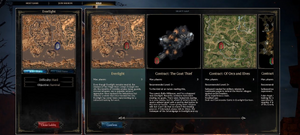
The game features a story-driven campaign and a skirmish mode which allows players to fight battles on the game's maps without previously playing through the campaign mode. Both modes can be played alone or with other players online. In skirmish mode, players can share responsibilities of managing a single race with others. Journey Mode allows players to play the game alone or in co-op mode on skirmish maps but also features a campaign system. Unlike in regular free play, players can create a Journey hero which will be the same for all these maps and which can be customized from the races and skill trees from the base game as well as the expansions. Player can play official Journey Mode maps and also player-made maps or skirmish maps that are Journey Mode compatible in order to level up their hero and gain new equipment that is then saved to the hero and available on the next map they choose. Journey Mode maps also contain quests that carry over between maps as well as fully voiced dialogue for the hero and various non-player characters. Arena Mode pits players against ever-increasing hordes of enemy units.
Customization
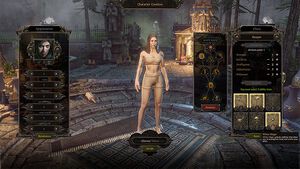
Players can create their own character in campaign mode, customizing appearance and gender. They can also choose three different skill trees, depending on the chosen fighting style. All player-created characters have a fourth skill tree called "Leadership" which contains skills related to the real-time strategy parts of the game. Each character has five attributes which influence what weapons, armor and items they can use as well their health, focus, damage, block and critical strike chances. During the campaign, a large number of companions can be recruited. All characters gain experience points by killing enemies and completing quests, regardless of whether they were involved in combat or the quest. Experience points allow players to unlock improvements for their character and companions, such as learning new skills, improving attributes and unlocking advanced equipment.
Skills
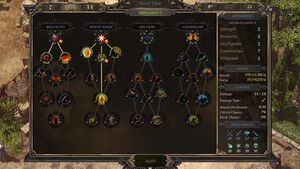
The skill-wheel was added for the first time in the SpellForce series and allows players to quickly select and perform an action. Both the main character and companions have skills which come in three forms: spells, auras and passive. Spells must be activated and sometimes targeted. They allow players to focus a positive or negative effect, e.g. healing a group of friendly units or damaging a certain enemy. Auras have a positive effect on nearby friendly units or a negative effect on nearby enemy units. Passive skills improve a character's abilities directly, such as increasing damage dealt with a certain weapon or heightened health regeneration. Skills are grouped into skill trees, requiring players to unlock certain skills first before others. All skills can be upgraded once or twice, with the base skill of each tree having eight possible upgrades. Each companion has a special powerful skill that can only be unlocked by completing a side quest. Spells and auras must be "equipped" before they can be used in battle. Players are limited to three spells and/or auras, and must strategically choose which spells or auras to equip. Skills are depicted as pictograms below each character's portrait in the upper left corner of the screen and can be accessed by clicking on them. The game displays potions and equipped items in a slot next to the skills slot.
Maps
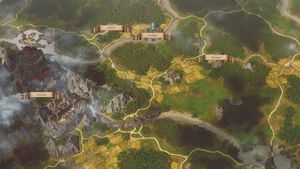
Maps that allow the player to control an army are separated into sectors. The main character or a companion are required to create outposts to expand their territory. Resources are limited in each sector and transported by automatic horse carriages between several sectors. The carriages can be attacked by enemies. Unlike in most real-time strategy games, workers are limited in each sector and cannot be controlled directly; instead, they are assigned to a building. Controlled sectors must be next to each other, otherwise resources will not be shared. Because the number of workers is limited for each sector and the number and level of outposts also determines the number of units the player can make, expansion is required to build, harvest resources and create more units.
Factions
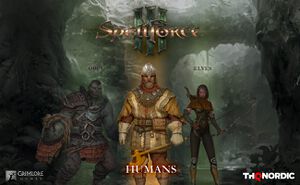
Players can choose a race to control when entering a map with RTS elements. There are three races to choose from: Elves, Humans and Orcs, down from six in the first game and nine (bundled in three factions) in the second game. Elves favor defense, including strong buildings and outposts that can defend themselves. Orcs favor fast expansion and brute force. Humans favor defense and offense equally. Advanced units and buildings require the player to find blueprints or buy them from merchants.
Development
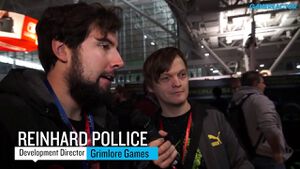
Development of SpellForce 3 took over four years. THQ Nordic first mentioned a new entry in the SpellForce series was in development in September 2013, while announcing the release date for SpellForce 2: Demons of the Past, the third expansion for SpellForce 2. Development began at the start of 2014 at the gaming studio Grimlore Games, which THQ Nordic established in Munich in 2013. THQ Nordic previewed SpellForce 3 with screenshots at Gamescom 2014 and 2015, sparking interest in the game from trade magazines. The first hands-on preview was shown at Gamescom 2016 where multiple features were demonstrated. Although THQ Nordic announced SpellForce 3 would be released in 2016, the release date was later changed to 7 December 2017, a year later than originally planned. The developers released patches to address most issues, at one point releasing patches multiple times a day. Within two weeks of release, the developers had issued 21 patches. On 9 February 2018, THQ Nordic released a level editor and modding tools that allow players to create new maps, quests and campaigns with plans to support sharing user-generated content through the Steam Workshop.
Reforced edition
An upgraded version entitled SpellForce 3: Reforced was released for Microsoft Windows, PlayStation 4, PlayStation 5, Xbox One and Xbox Series X/S four years after the release of SpellForce 3 on 6 December 2021. Reforced was made available for free to buyers of the original version of SpellForce 3. Reforced includes new game modes: Journey Mode and also bring mechanics and designs introduced in the expansions to the base game as well as improvements to graphics, artificial intelligence and loot distribution.
Reception
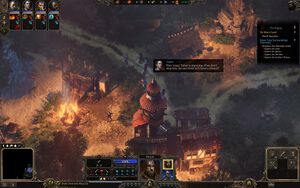
SpellForce 3 garnered "mixed or average reviews" from critics.
Critics lauded the visual design and the attention to details. German magazine PC Games compared the graphics and level of detail positively to The Witcher 3: Wild Hunt, although they noted the game no longer offered a third person perspective as previous games of the series did. GameSpot criticized the amount of detail, which caused slow loading times and overwhelmed the player, making it hard to notice certain important elements. The soundtrack of SpellForce 3 was considered to fit well and helped to create the game's atmosphere. Some critics emphasized the sounds helped establish a great ambience, others considered them sub-par, highlighting that combat sounds don't exactly match displayed combat and some effects feel generic, out of place and repetitive. Reviewers were also divided over the game's voice acting, with Wccftech opining that the voice actors were not skilled enough and at least one voice actor was miscast to the point of distraction. It was also noted the written dialog does not match the speech in several places. Conversely, other reviewers lauded the voice acting, especially of the main characters. For the German original version, the voice acting was generally considered good, although reviewers noted that orcs sounded too tame and that the narrator's voice acting did not fit with the game's atmosphere.
The plot and storytelling also drew mixed reactions. Some reviewers noted the game offers a compelling story with believable characters and ample lore. PC Gamer praised the story but noted the number of similarities to Dragon Age and The Witcher series, and criticized the companions as likeable but not memorable. Jeuxvideo considered the plot too generic and simple and Wccftech criticized the forced deliverance. GameSpot also noted that although some choices can be made, they never change the story enough to make players want to replay the game.
The combination of role-playing and real-time strategy was considered a success, with many reviewers noting the unique and cohesive experience created by the merger. Critics also praised the smooth transition between RPG and RTS and how naturally the RTS elements fit into the story. Some critics noted the differences between the factions in RTS mode were mostly cosmetic and without real distinctions and the RTS parts were weak on their own. Conversely, some reviewers noted that by trying to be two games at once, SpellForce 3 failed to be outstanding in either category.
The game's multiplayer was considered by some, such as Eurogamer, as decent but unspectacular. Rock, Paper, Shotgun expressed surprise that the multiplayer worked so well despite the missing context of the single player campaign and associated quests.
A major criticism was the game's technical issues on release. Critics likened the release to a beta version and pointed out various bugs, such as missing triggers for missions and broken quests, leave players unable to progress in the game. Further criticism was directed at the slow camera rotation, and units' movement speeds and pathfinding. GameStar considered the number of bugs severe enough to deduct 15 points (out of 100) from their score of 82. The magazine later updated the score to 77/100 after most bugs were fixed and later upgraded the score to 84 upon release of the Reforced edition Both Gamestar and fellow German trade publication PC Games, which did not review the game until version 1.21 had been released, advised players to wait until the bugs were fixed before buying the game. Reaction from players was equally mixed, with many criticizing the technical issues on release.
